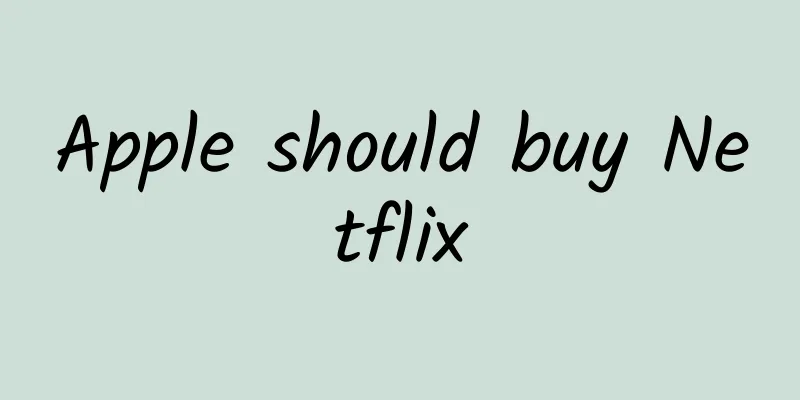Apple should buy Netflix

|
While the focus of Apple's event last Thursday was on the new MacBook Pro (and the lack of updates to the MacBook and MacBook Air), perhaps more interesting from a strategic perspective was the launch of the Apple TV. Tim Cook clearly articulated Apple's goals:
After the app demo, Cook concluded:
Unless, of course, you want to watch Netflix. Apple’s leverage game There is a reason why Apple can dominate the market. It is based on user loyalty. The best example is the iPhone.
The iPhone isn’t Apple’s first experiment with this approach: perhaps the most famous examples are the stories between suppliers and the iPod and iTunes music store, where Apple, with its loyal users, has dictated the terms of cooperation with the music industry. In some ways, this is an even more remarkable achievement because operators offer almost no differentiated services, while music labels have exclusive rights to different types of music and should have more say in negotiations with Apple. In fact, Apple's bargaining chips played a greater role in the negotiation process, especially when the iTunes music store was first launched. Music labels were plagued by pirated music, and no matter how harsh Apple's iTunes music store was, it was better than being pirated. Therefore, major labels had to provide genuine music for the iTunes music store. You know, for many years, Apple has been fighting and failing to protect content copyrights according to the terms, so it is not surprising that Apple will continue to encounter problems in this regard on Apple TV - executives seem to have forgotten the importance of piracy leverage to the success of the iTunes Music Store. Apple's attitude towards paid video content has always been - never allow bargaining. Here is a report from the Wall Street Journal last summer, one of countless cases related to Apple's content copyright:
The times may indeed be on Apple's side, but for Cue and Apple, the entire right to speak on video content does not belong to them, and the latter is more important. The real threat to paid content providers is Netflix. Yes, yes, Netflix is considered a pirate, but unfortunately for Apple, it is a company that can truly enable Apple to have a say in video content. The rise of Netflix Just like how Apple did with the music business in the 2000s, Netflix also took the path of becoming a friend of the old industry it wanted to disrupt: selling DVDs was just a rudimentary practice in the pay video industry. When Netflix successfully crossed over to the streaming business through its deal with Starz, the industry foolishly thought that Netflix had a lot of money and Starz made a lot of money. However, it is important to understand that streaming media has truly revolutionized the user experience : although Starz has a catalog of 11,000 movies, there is only one effective path to access them: users must go through the Starz cable TV channel to access these resources. However, on Netflix, the effective number of catalogs is 11,000: Netflix customers can open these resources on any device. This unprecedented excellent user experience has driven Netflix's user base to grow exponentially, which further enables Netflix to acquire more content resources. At the same time, the traditional cable TV industry still regards profitability as its most important goal; when Netflix gradually attracted the old customers of the traditional cable TV industry giants, the latter suddenly realized that Netflix was eating into their market, just like what happened to Apple when it was doing music in the 2000s. At the same time, Netflix is investing in its own original content and doing business directly with content creators, which further strengthens its value proposition to customers, further weakens the negotiating power of traditional cable TV, and lays the foundation for Netflix to use the Internet to serve nearly every customer. Netflix's strategy is a textbook example of aggregation theory. It has formed a strong monopoly in the paid video industry, not by controlling the distribution channels (at least not in the early days), but by relying on the virtuous cycle brought about by excellent user experience: the number of subscribers Netflix has allows it to have more say in suppliers, so it can get better content, and high-quality content can attract more users to join. At the same time, the further growth of the user base can make it more influential in suppliers. It is this virtuous "distribution spiral" that has brought Netflix a high valuation of $54 billion, which means a sky-high price-to-earnings ratio of 340 times. The company has spent billions of dollars on original content, and it is likely to dominate the entire network and even threaten Hollywood's long-standing monopoly on content. The biggest question is probably whether Netflix has enough financial muscle to keep up the momentum. Last quarter's financial statements showed that Netflix suffered a cash loss of $5.06 billion as the company was undergoing a transformation from a distributor of licensed content to a sole producer of original content, and original series often require several months or even years of investment. The transformation allowed Netflix to leave behind its traditional rivals and further gain more chips in the field of video content, but all of this required money. It is conceivable that Netflix will have to live on debt before attracting enough paying users. The media is divided on Netflix’s “absence” from Apple’s new TV app matrix: long before Apple’s press conference, Peter Kafka reported that Netflix would not join, but in an article in Wired, Netflix said the company was “evaluating the opportunity for this partnership.” However, I personally think that all the reports actually only illustrate one thing: Apple is determined to create a unified entrance for all TV platforms. To it, Netflix is at best a content provider, no different from HBO and those traditional cable TV companies that have no mass base and are on the verge of despair. But this is obviously not what Netflix wants. Netflix has long relied on its excellent user experience to strengthen its relationship with users and grow step by step. Apple seems to be planning to adopt the same strategy, but it does not have enough influence in the video field to do so. Apple TV is not just another black box that connects to the TV (and it's the most expensive one), it also has an open application platform, which is naturally a good thing for Netflix, as users can enjoy Netflix's services more conveniently on it: Netflix can play content on Apple hardware according to its own terms, and Apple can do nothing about it. Indeed, Apple executives seem to be still stuck in the iPod/iTunes era, when a 70% share of music players was enough to make them king of the music world. However, now that streaming content can be enjoyed on any device at any time, hardware sales are no longer a core competitive point. If Apple wants to acquire end users in the same volume as usual, it may have to find a way to pay for it. I mean, buy Netflix! Why Apple Should Buy Netflix I have always been skeptical of large acquisitions because they are most likely byproducts of management in the process of building a so-called business empire, and are often detrimental to the interests of shareholders. The outcome of such business behavior is often like this: the so-called "adding wings to a tiger" becomes wishful thinking, and the acquirer and the acquired party fall into a dilemma of being unable to do anything, and have a hard time for several years. I’m even less confident if such an acquisition requires bringing two very different business models under one roof: horizontal and vertical, which Netflix and Apple clearly represent. In this case, why should I still help these two matchmakers? Isn't this a contradiction? Of course not. First of all, the benefits to Apple cannot be ignored:
In summary, if Apple acquires Netflix, it will:
For Netflix, the benefits are obvious.
This would undoubtedly be a massive deal: Apple would likely need to pay at least a 20% premium, which would imply a purchase price of at least $65 billion (I’d bet higher). However, the biggest reason I doubt this deal will happen is that I don’t think Netflix would be willing to be acquired at this point: after all, the company has done so much long-term strategic and practical work step by step to continuously improve the user experience. If Netflix can guarantee sufficient cash flow, then the right to speak in the field of video content will be in their hands. It’s true that Amazon Prime Video is a huge threat, especially with the advantages of their orthogonal business model and the deep pockets of a large company, which puts them on par with Netflix in terms of their ability to acquire content, but then again, having done so much, do you think Reed Hastings, who runs Netflix, will let all this effort end in an acquisition? As for Apple, Cook has been firmly following Steve Jobs' playbook, which would seem to rule out the possibility of them making such a transformative acquisition. Nevertheless, there are signs that Apple's pressure has begun to show: Apple Watch is already on the market, but the company is raising prices to maintain profit margins and average selling prices, while also seemingly trying to cut costs. Isn't this a sign that Apple is looking for more possibilities in the future rather than squeezing the last drop of blood out of the iPhone? In the future, the iPhone can continue to play the role of a cash cow, while Netflix can be run as an independent subsidiary - as a new growth driver, it may create a new future for Apple again. As a winner of Toutiao's Qingyun Plan and Baijiahao's Bai+ Plan, the 2019 Baidu Digital Author of the Year, the Baijiahao's Most Popular Author in the Technology Field, the 2019 Sogou Technology and Culture Author, and the 2021 Baijiahao Quarterly Influential Creator, he has won many awards, including the 2013 Sohu Best Industry Media Person, the 2015 China New Media Entrepreneurship Competition Beijing Third Place, the 2015 Guangmang Experience Award, the 2015 China New Media Entrepreneurship Competition Finals Third Place, and the 2018 Baidu Dynamic Annual Powerful Celebrity. |
<<: Japan conducts 5G network-connected self-driving car trials
Recommend
4K gaming large screen TCL 55E6700 gaming TV review
In the era of comprehensive TV intelligence, the ...
Did its great-great-great-great-great-grandson grow back to look like it? The creatures in this lake have been trapped in the same year
Every February 2nd, North America welcomes the tr...
How to find seed users in product operation?
1. What is a seed user ? Seed users, as the name ...
The entire process of setting up and optimizing information flow advertising accounts, a must-read for placements!
Too little exposure and no sales? How to set a re...
Xiaohongshu Promotion Method | Is the Grass-Planting List Still Reliable?
A few days ago, Xiaohongshu released a "Litt...
Is the virus strain prevalent in Beijing more virulent than that in Guangzhou? Authoritative interpretation →
The new coronavirus variants currently prevalent ...
How long will it take for your job to be replaced by a machine?
Many people believe that the world is about to us...
Electric car time-sharing rental: a tough piece of cake
Electric car time-sharing rental (also known as &...
Thrilling! Is a sore throat fatal? If you have these symptoms, you must see a doctor immediately!
Recently, a 26-year-old girl died due to a sore t...
Dell's all-in acquisition of EMC causes 10 shocks
[[151859]] Text/Lao Liang on the front line Hopef...
Abaoye Tarot Xiaohongshu Project, teach you how to generate traffic and how to realize the value of 1,700 yuan
Abaoye Tarot Xiaohongshu Project, teach you how t...
The Origin and Experiment of the Infinite Monkey Law
Leviathan Press: According to the calculation met...
How to get an invoice for Tencent advertising recharge? Invoice application guide!
How to apply for an invoice 1.How to get the invo...
A 92-second video was sold for a whopping $3.5 million. Is NFT, which makes Bitcoin pale in comparison, really that valuable?
If you think virtual currency is unreliable, then...
What are the functions of the Guangzhou Auto Mini Program? How much does it cost to develop a WeChat car mini program?
In 2021, China's car ownership will reach 350...









